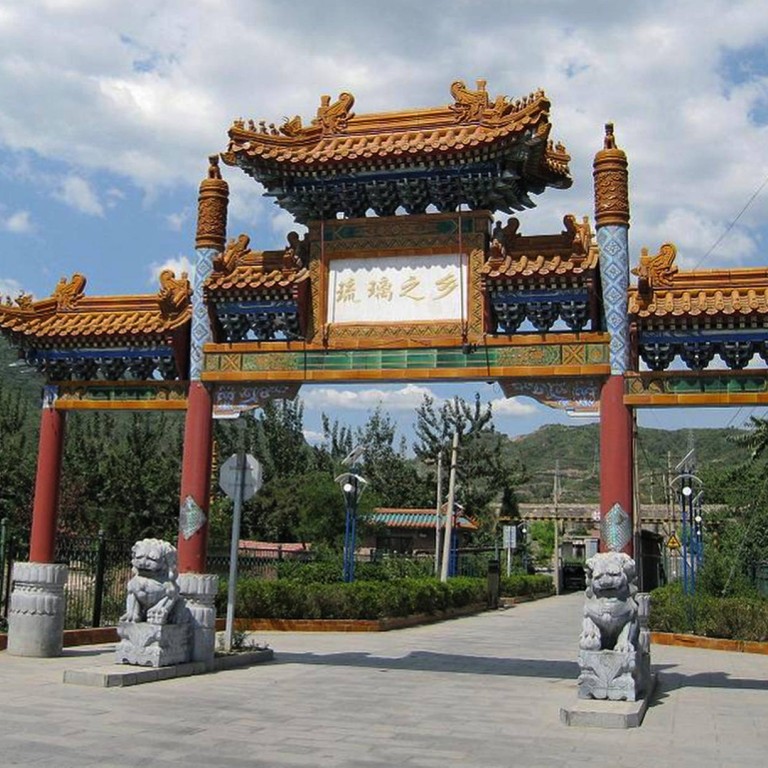
Liuliqu villagers say conservation status has denied them benefits of development
Residents of scenic Liuliqu outside Beijing complain that the village's special conservation status has denied it the benefits of development
Liuliqu - on the banks of the Yongding River, at the foot of Jiulong Mountain - holds a place in the national imagination as a village that has remained largely untouched since ancient times.
Nestled in suburban Beijing, Liuliqu was reputed to be among the "most beautiful of villages" in Beijing. Today, it is a vanguard for a centuries-old traditional manufacture of glazed tiles as well as being a historical landmark - but it is the latter role that is proving controversial.
Its status as a conservation area - accorded by the central government - has been holding it back, according to many of the village's 2,000 residents. They say it has stopped villagers benefitting from Premier Li Keqiang's urbanisation plan.
Watch: The Chinese village that does not want to be conserved
It has also created obstacles in improving the quality of life there. Contrary to its ancient reputation for beauty, the hamlet is poor and dirty, residents say.
"Without these two [roles], our village would have been developed a long time ago. And [the village] would not be so dirty, messy and poor like it is now," says village committee deputy secretary Yao Guangcheng.
The problems in Liuliqu are not unique. Some 1,500 villages across the country now carry the conservation designation, a status intended to protect sites' cultural and historical value from the unintended consequences of rapid urbanisation.
The designation of "traditional village" was created in response to calls from some of the nation's leading writers and artists for conservation efforts to protect rural cultural sites.
Local governments are being asked to nominate more villages under the project, spearheaded by writer Feng Jicai , a member of the Chinese People's Political Consultative Conference and deputy chairman of the China Federation of Literary and Art Circles.
But to villagers, the designation is a stumbling block to progress. "It wasn't easy to win these titles back then, but it turned out nothing real followed," said Yao.
Yao said that, in 2007, guided by the Mentougou district government, Liuliqu became one of the three "villages of historical and cultural interest" in Beijing. Five years later, it naturally landed on the list of traditional villages for conservation, when three ministries jointly asked local governments to identify villages across China that were worthy of special conservation.
Without the designation ... our village would not be so dirty, messy and poor
Except for one meeting on the conservation of ancient architecture by the municipality's cultural relics and culture authorities, the conservation status did not come with funding, support or protection for the village, said Yao. But it has hampered a real estate developer's plan to build a villa community there, which villagers say would bring better housing and public services.
The developer expressed interest in 2007, submitting several draft plans to the government, but none were approved.
Feng, the writer, said in March that the "traditional village" status is an empty one as it has not stopped culture and traditions from vanishing amid rapid modern changes. "[This is] due to the lack of special funds, regulations, commitment and implementation of local governments, scientific assessment, devotion of experts and professionals, and follow-up plans," he told the newspaper.
The project was controversial from the start as many advocates of urbanisation said it would keep farmers from sharing the benefits of a richer China.
"People's desire for better life is universal," Yuan Chongfa , vice-president of the China City Development Academy, said. "We can't simply sacrifice some people's livelihood because of some men of letters' yearning for the good old days."
Liuliqu resident Geng Jianhua said there were several old courtyard homes from the Qing dynasty (1644-1911) that were worth protecting, but the whole village was excluded from the central government's renovation or demolition plans.
"Most of the buildings here are brick and cement structures built decades ago. For cultural conservation, they have no value, and for daily living, they are too old," he said, "All we want is to live in a better place."
Yang Baopo, who owns one of two glazed-tile factories in the village, said nearly all locals under the age of 50 had left the village to work in downtown areas.
"It's hard to create new jobs in the village and I don't think it deserves the name of a traditional village if we don't even have people here," he said.
His factory is considered a heritage site. With about 40 workers, most of them local, the factory still produces tiles using earthen kilns. The glazed tiles were used in imperial homes, reaching their highest popularity during Emperor Qianlong's reign in the 18th century.
Though determined to keep the trade alive, Yang would welcome the investment of a real-estate developer - even if it meant tearing down his factory.
"Everyone else has been moving forward, and we are lagging behind because of a handful of courtyards," he said, claiming almost all villagers shared his view.
Yao, the deputy secretary, said that right after the village won the first conservation title in 2007, the district government spent 300,000 yuan (HK$377,000) on a detailed plan to make the village a tourist destination, but the plan never came to fruition, for reasons beyond his knowledge.
He said a few years ago, staff from the Ministry of Housing and Urban-Rural Development visited the village committee. They told him that the central government had set aside for the village 1 million yuan of the "conservation fee", to be placed under the care of the Mentougou district's culture committee.
When Yao consulted the committee, "they said there was absolutely nothing like this at all," he said. "So we let it be."

